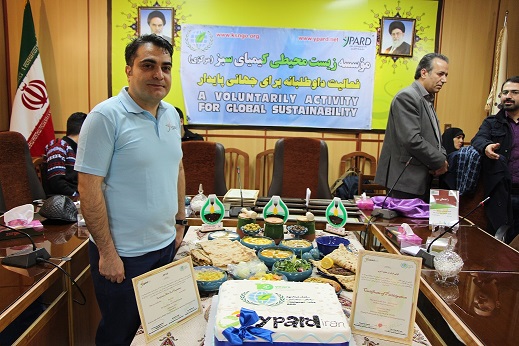-
About
- Our Work
- Get Involved
- Stay Updated

When it comes to agriculture, farm and farmer are more concerned and residential area of village is forgotten, while when it comes to living place of farmers, arable land, gardens, livestock breeding ground, and other agricultural products are forgotten. It was always a question for me that why agricultural and rural issues should not be considered and solved together and why rural environment should not have certain ecological features to attract people and youth. Are environmental problems important merely in urban areas and for some special people?
Rural areas have the highest potential to be eco-friendly places to attract investors and tourists, due to low number of population and lack of complexities of big cities. When we rate hotels for accommodation of tourists and assign star for them, why we should not do such work for rural areas and eco-tourists?
That is why, in YPARD Iran plan, we decided to design a new model by developing special standards for villages having potential to be converted environments with such features, through collaboration of environment network of Markazi nongovernmental organizations (NGOs) during the past year by holding many and consecutive meetings. Fortunately, this plan has been finalized. In this plan, five problems of conventional agriculture and environment of residential areas have been considered, with a special attention to the participation of youth and women. Production of healthy and organic products by considering climate changes, coping strategies and creation of resistance against it, optimal use of agriculture and rural waste, and the use of renewable energy in all environments were considered in this plan by educating rural people and encouraging them to supply eco-friendly products and services to attract agricultural and rural tourism.
Seeing key issues of GCARD3, fortunately, I realized that components of this model are closely related and overlapped with goals of this event. Eco-friendly villages can be places where the latest academic and research organizations achievements can be displayed and farmers can find its efficiency and effectiveness, who often trust in new technology late. In addition, results of studies that have not been produced widely and require investor, that large number of them can be accessed by farmer, can be displayed in these eco-friendly environments to attract investor. On other hand, expectations of farmers, especially in improving the eco-friendly agricultural methods, can be evaluated in these environments so that research and scientific activities to be conducted in science and research centers in line each other.
By establishing such villages in various areas, in addition to direct supply of agricultural products to eco-tourists, certified organic and healthy agricultural products can be supplied directly for producer in local markets at affordable prices and greater profits by creating participatory guaranty systems. Direct supply of products, local crafts, and accommodation in a village where environmental indicators are met and, for example, most part of its energy is supplied by renewable sources, can lead to agricultural and rural tourism attractions and better future for rural people in terms of living standards.
In addition to providing this model to be implemented around the world, I hope that I can use viewpoints of experts, specialists, and enthusiasts to improve this model in implementation phase as one of the YPARD Asia and Pacific plans by participating in this event. Fortunately, this model has been welcome well by rural people and officials of Hazaveh Village in Markazi Province, and its implementation phase will begin in next months by funding.
Joining to local NGOs, I began voluntary activities since I was 18 years old, and I selected agriculture as field of study due to interest in nature and plants. After receiving master's degree in agronomy in 2004, I went to India to study at PhD level. Title of my dissertation was “organic cropping systems” conducted in Indian Agricultural Research Institute. After graduation in 2010, in addition to research collaboration with universities, I have engaged in voluntary activities to develop agriculture in Iran, particularly eco-friendly agriculture, as Iran Representative of YPARD and Program Officer of YPARD Asia and Pacific.
This blog post is part of the GCARD3 Youth blogpost applications. The content, structure and grammar is at the discretion of the author only.
About the author
Related Posts
Comments
No comments made yet. Be the first to submit a commentBy accepting you will be accessing a service provided by a third-party external to https://www.ypard.net/
Get in touch
Email: [email protected]
YPARD Global Coordination UnitHosted by AGRIDEA and the Czech University of Life Sciences Prague
Lausanne, Switzerland and Prague, Czech Republic - Our Work


